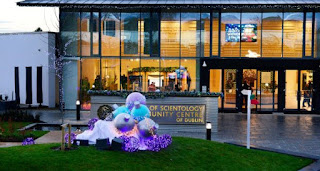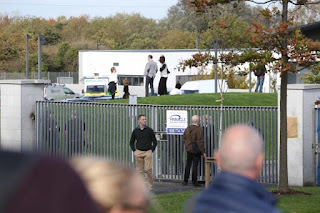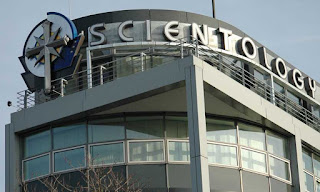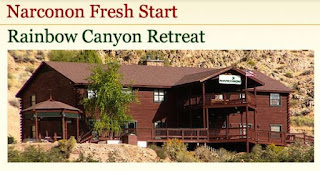It’s listed on the NHS website and claims to be a ‘world leader’ in tackling substance abuse. But there is a shocking side to the Narconon addiction facility – as our nine-month investigation reveals
The Guardian
Shanti Das
Feb 3, 2024
In a secluded compound in the Sussex countryside, surrounded by fields of sheep, sits an addiction centre marketed as the “friendliest rehab” in the UK. Each year, a stream of people arrive at its gates, pass through neatly tended gardens and enter a grand white mansion, hoping to get “drug-free for good”.
The charity that runs the facility, Narconon UK, says it is a world leader in tackling drug and alcohol misuse, claiming results superior to its rivals through a sauna detox, high vitamin doses and psychological exercises.
Its credentials appear to stack up: Narconon is listed on the NHS website, included in council directories, and displays a “good” rating from the Care Quality Commission (CQC) in its marketing, alongside dozens of testimonials. “Narconon gave me my life back,” says one smiling client.
But behind the glossy image there is another side to the story. A nine-month investigation has uncovered allegations of safeguarding failings and psychological abuse at Narconon’s premises in Heathfield, East Sussex. It also suggests that – despite reassuring clients it is independent – the rehabilitation programme is more closely entwined with the controversial Church of Scientology than it lets on.
In interviews with the Observer, former patients and staff described how people seeking help were put through intensive mental exercises – “drills” – similar to methods used in Scientology’s “auditing” process.
In some cases, they took part in these repetitive drills for so long, while in vulnerable states due to their mental health or prior drug use, that they would go into “hypnotic” states, become paranoid or break down or suffer other extreme reactions. After taking part in the drills, which could last up to five hours a day for several weeks, others were allegedly left “traumatised”, feeling suicidal, with their minds “shattered”.
One former Narconon staff member, racked with guilt over their part in the operation, claimed they watched people “break” during exercises they likened to “obedience training”.
The allegations, and evidence gathered in undercover calls, also suggest clients were admitted to the rehab despite histories of mental illness and were misled about the extent of Scientology’s influence. Yet despite attempts to raise the alarm – including 19 complaints to the CQC, the watchdog responsible for overseeing substance misuse services in England – the facility has not been inspected for eight years and has never been assessed to ensure it is safe. The regulator says Narconon’s “alternative” approach does not fall within its remit – so it has no duty to investigate. The Department of Health said it was a matter for the CQC.
So who is accountable for safeguarding vulnerable people at unregulated rehabs such as Narconon? And how can a facility accused of abuse, linked to one of the world’s most controversial movements, have been allowed to operate for years, with no formal oversight at all?
Launched in the US in 1966, Narconon is billed as a “holistic, non-medical and secular” approach to rehabilitation. Its residential programme is based on the belief of L Ron Hubbard, Scientology’s founder, that toxic drug residues lodge in the body long after use, creating a “biochemical barrier to spiritual well-being”.
To remove them, patients complete a “purification rundown” involving five-hour sauna sessions, treadmill exercise and high doses of vitamins. They later do psychological exercises and a course known as “life skills”. The goal is to achieve a “clear body” and a “clear mind”.
Hubbard’s theories about drug residues are rejected by the scientific community, and addiction experts argue the methods are not evidence-based. But Narconon insists its approach is robust. It has 30 centres across the world offering help for substances including alcohol, marijuana, cocaine, heroin and prescription drugs, and claims to have saved tens of thousands of lives.
In 2015, it announced an expansion of its UK operations with the opening of the 16-bed facility near Heathfield – about 20 miles from Scientology’s HQ. In a ribbon-cutting ceremony attended by local politicians, it said the centre marked a new era in UK drug treatment. “With the country suffering from a drug abuse epidemic, a new drug-free drug rehabilitation centre brings hope,” it said.
Since then, it has secured listings on luxury rehab websites and run online ad campaigns. Managers regularly post in Facebook groups for those trying to get clean. “The friendliest drug and alcohol rehab in the UK welcomes new programme participants in a safe and welcoming environment,” read a recent post, followed by a smiley emoji.
The programme typically lasts three to four months and costs about £15,000. Many of those enrolling are not Scientologists.
Often, they are drawn to Narconon’s purported “natural” approach. “I’d heard of the Priory and this just seemed, from what they were saying, more like a wellness, mental health-y type of place,” one former client said.
Parts of the programme are strict. Patients – referred to as students – are expected to wear identical tracksuits, have regimented schedules and spend hours studying. As is common at some other rehabs, they also surrender their phones upon entry and cut off contact with the outside world, save for pre-approved calls or visits.
They had a duty of care to look after me but it messed me up badly. I came out significantly worse than when I went in
anonymous patient.
During their first days, patients undergo a “drug free” withdrawal, with massages (“assists”) and no medicines such as methadone to wean them off. They complete a five-week “detox”, with up to five hours a day in a sauna, running on a treadmill and taking a cocktail of vitamins.
Hubbard’s book Clear Body, Clear Mind recommends the main ingredient, niacin, is taken in an initial dose of 100mg which increases to 5,000mg for those deemed fit to receive it – 333 times the recommended daily amount.
The NHS says high doses of niacin can cause skin flushes and – over long periods – liver damage. The approach has previously been linked to reports of adverse reactions. Narconon said safety incidents were “very rare” – and for most people, the detox does not seem harmful. One participant said this phase was “like jail” because you are “left alone with your thoughts,” but that it enabled them to rest. Another said: “That first part, the detox, was kind of cool.”
During the next phase, the intensity ramps up. Participants take
Nine people with knowledge of Narconon’s operations gave corroborating accounts of how participants were put in pairs and required to follow or give commands – touching or pointing to items, or standing up and sitting down – repeatedly.
One former staff member described this phase, known as The Objectives, as “gruesome”. “There are certain criteria the addicts need to reach, but you are not even told what they are. [They] can’t tell you how long the session will last. It’s just: touch that, touch that, touch that, touch that. It can be any inanimate object. Or it might be, ‘Sit down, stand up.”
To move on to the next stage, “students” must meet criteria – such as demonstrating equal response times between completing commands or having an epiphany unprompted about their behaviour or life. Sessions were monitored by a senior staff member – often Scientologists – who would ensure compliance and decide when the exercise was completed in line with Hubbard’s writings, which ex-staff said were treated “like the Bible”.
Sometimes people would sometimes be stuck on stages “for days” because they “didn’t understand what they were expected to do”, one person said. If participants asked questions, they got no reply. “It is ignored. There is no input whatsoever.”
The drills left some feeling “degraded” and “stuck”. “It was like I had been chained. I can’t leave the room. I can’t answer the questions. I can’t not do the command. I can’t make it end,” one person said. While not physically restrained, they were strongly discouraged from leaving.
Other times, participants became paranoid, anxious or acutely distressed. “They were clearly very unwell,” a witness said. “I saw people yelling and screaming. Physical outbursts. Some people would laugh, others would cry.”
Several witnesses described how people would go into hypnotic or trance-like states, “spacing out” or experiencing “depersonalisation”. “They taught me that usually you go through these exercises until you … get to a point where you feel that your body doesn’t belong to you. You might see yourself from above,” one person said.
Sheila MacLean, Narconon’s manager, said the drills were designed to teach the participants self-determinism, self-control and discipline, and to help them break away from destructive habits. “These phases are not easy but our feedback has been hugely positive and the results speak for themselves,” she said.
But some former participants described being left “traumatised”. “The best way to describe it is that my mind had been shattered into a million pieces. I’d lost all sense of myself,” one person said.
“They had a duty of care to look after me but it messed me up badly. I came out worse – significantly worse – than when I went in.”
The Observer also spoke to ex-staff who described being left distressed by their part in the process.
Although most senior employees are understood to be Scientologists, many junior staff and volunteers are not. Despite having no history of substance misuse, they too were required to complete the programme.
Speaking through tears, years after leaving Narconon for another job, one argued the approach was dangerous. “They are training you to follow orders, but these are vulnerable people and it can be traumatic,” they said. “I knew it was wrong. But at the moment I didn’t summon the strength to stand up.”
Independent experts said the drills were reminiscent of a “military boot camp” or “obedience training”. The Observer first asked their views without disclosing the link to Scientology.
Prof Tim Millar, professor of substance use and addictions at Manchester University, said he was astonished by the allegations. During 30 years researching drug treatment in England he said he had never seen such techniques. “They’re not approaches that I’m aware of being used in any other mental health context,” he added.
He said he was concerned the “instruction sessions” could feel “punitive” for people seeking treatment. “My personal view is that rehabilitation should be about using humane approaches to help people to regain their sense of self worth, which makes me doubt that any punitive approach would be helpful,” he said.“I find some of the descriptions of people’s reactions quite shocking. They are so far removed from anything that I’ve encountered that it’s hard to put into words.”
Dr David Bremner, medical director for drug and alcohol charity Turning Point, said requiring vulnerable people to complete repetitive drills could leave them in a state of “heightened suggestibility”. “Through these repetitive actions, the process of breaking someone down to being less than what they think they are makes them even more susceptible to suggestion. And then you’ve got somebody who’s in a position of psychological obedience where you are able to then tell them what you want them to believe,” he said.
Prof Sally Marlow, from the Institute of Psychiatry, Psychology and Neuroscience at King’s College London, likened the approach to reprogramming. “The methods, as they are described, do not appear to be therapeutic. They appear to be something else. This is not understanding a person and where a person is coming from,” she said. “I think it is extremely concerning, regardless of what I think about Scientology.”
Participants later took part in a “life skills” course where exercises included writing down everything bad they had ever done, and handing this to Narconon. People who spoke to the Observer said this left people feeling exposed. “It’s like they’re poking around in the darkest corners of your soul,” an ex-staff member said. They said they believed the programme could be beneficial for some, but often believed it did “more damage than good”.
The Observer’s investigation also casts doubt on Narconon’s claim to be a secular programme that is separate from Scientology. Clients said they had been reassured the centre was independent of the movement. One ex-staff member with knowledge of the sales process said: “They [Narconon] are really good at convincing the families that this is what your child or your family member needs. They don’t focus on the Scientology aspect at all.”
But the two are closely entwined. The International Association of Scientologists is the principal funding source for the Narconon Trust charity – which owns Narconon’s Heathfield premises and supports Narconon’s work in the UK. Several senior Narconon figures are Scientologists, including Janet Laveau, the managing director of Scientology UK and a trustee of the Narconon Trust, and MacLean, Narconon UK’s executive director and registered manager.
Scientology beliefs also appear to influence Narconon’s approach. Participants are allegedly told they cannot take part if they are on psychiatric medication, consistent with Scientology’s belief that psychiatry is harmful.
Meanwhile Narconon’s psychological drills resemble methods used in wider Scientology. Scientologists believe spiritual beings known as thetans infest every person’s body. Through a process known as “auditing”, they believe they can bring these thetans under control – helping people on a path to spiritual enlightenment.
You’re helpless there, and the only way out is blind submission or lose thousands of pounds
To learn the skills Scientology says are needed for auditing, followers take part in a series of drills known as “training routines”. Scientology materials show these include giving and receiving directions, sitting still for prolonged periods, and repetitive questioning – much like in the Narconon drills. US campaign group Narconon Exposed has argued the two are closely linked, claiming the Narconon Objectives are a “religiously-based doctrine and practice”, with “absolutely no clinical relevance to drug rehabilitation”. Narconon denies this.
The link raises the question of whether participants are exposed to Scientology methods without informed consent. Several were reportedly unaware of the closeness with Scientology when they signed up. Once there, they were deterred from leaving by the fear of losing money or being rejected by friends or family.
“You’re helpless there, and the only way out is blind submission or lose thousands of pounds,” one person said. “If I’d have had any concept of what the programme actually was, I would never have signed up.”
To independently verify their claims, an Observer reporter approached the facility posing as the relative of someone needing treatment for addiction. During the call, a representative said Narconon was based on work by Hubbard, whom she described as a “humanitarian” who founded Scientology.
But she went on to claim that Narconon was “not related” to the religious movement. “Narconon is basically a secular organisation that is completely … It’s not related to the Church of Scientology,” she said.
“We try to keep it very straight to the point. We don’t promote it, and we shouldn’t do that either. If we did that, people would accuse Narconon of actually being a front to get people to Scientology. And that’s not what we’re trying to do.” She also described how Narconon had a “no refund policy”, with clients usually required to pay up front.
“Just think about the mental responsibility the addict has if the fees have been paid up front,” she said. “It’s a way of keeping the addict on the programme.”
In order to enrol, she said the proposed patient – a man in his thirties who was a drinker and cocaine user – could not be on antidepressants, and advised he speak to his GP.
Asked what to say, the Narconon representative said: “I think it has to be a decision that is communicated … He should go to a GP and say, ‘I have made a decision. I want to do alternative or natural remedies. I would like to come off this medication. How do I do it?’ It’s kind of a business in a way.” She added: “Doctors prescribe medication. That’s what they do.”
In an emailed statement to the Observer, Narconon UK said it had a “proven track record” of “successful rehabilitation for substance addiction” over five decades.
It denied downplaying its link to Scientology, saying it was open about its link to Hubbard. It did not deny similarities between the Narconon programme and Scientology methods, but said Hubbard’s approaches had a “positive secular application”.
Before being admitted, participants are sent to see a GP familiar with the programme. Concerns have been raised that these assessments were not thorough and that the focus was on physical rather than mental health. Narconon disputed this and said it had a policy of refusing people with “a history of psychosis, extensive psychiatric treatment or suicide attempts”.
A spokesperson also suggested people had concealed their histories of mental illness upon joining; denied advising people to come off medication to join the programme; said participants’ health was closely monitored, and said those with addictions that involved “dangerous withdrawals” underwent medically supervised withdrawal elsewhere first.
MacLean, Narconon’s registered manager, said it was “deeply regrettable” that some people did “not get on with the methods the programme employs”. “Even the best-run services have their critics,” she said.
She added: “We are running a programme for people with self-harm issues, who are seeking to break down deeply entrenched habits, which is not easy to do, and we do not pretend it is.
“The vast majority of people who come through the programme really benefit from it and are very happy with the outcome.” Narconon shared a folder of testimonials from ex-patients who say it transformed their lives.
But the allegations raise questions over why the facility is not subject to the same regulatory scrutiny that other rehabilitation units receive.
Records released under freedom of information laws show the Care Quality Commission has received 19 complaints about Narconon, including concerns about its methods and link to Scientology.
However, it has not formally investigated 14 of these – received since 2019 – claiming it has no duty to investigate and that the complaints are outside its remit.
There is no evidence to suggest the service is providing regulated activities for which they are registered
CQC guidance says services providing accommodation with substance misuse treatment are providing a regulated activity and must be registered for this, adding that this includes a range of interventions “such as managed withdrawal or detoxification, or a structured psychosocial treatment programme”.
But a CQC spokesperson suggested Narconon’s programme did not meet this criteria because the approach was “alternative” and did not involve medication. “There is no evidence to suggest that the service is currently providing regulated activities, for which they are registered with the Care Quality Commission, and therefore they remain dormant at this time,” they said.
Despite its programme being unregulated, Narconon continues to display a previous CQC “good” rating on its website. Records show the rating was from a 2016 inspection which covered the facilities, personal care and the safety of its sauna and vitamins – but did not judge the effectiveness of its programme.
The CQC report did not include details of the psychological drills or mention Scientology.
Former clients said they had been reassured by the CQC stamp of approval, believing it meant the programme was being actively monitored. “We did our research and it all looked above board,” one said. They added that they were “flabbergasted” Narconon had been able to accept vulnerable people for years without regulatory oversight. Dr Bremner, from the Turning Point charity, said: “We need better regulation.”
Another former Narconon participant, who we have chosen not to name, said his time there left him in a “dark place”. He has a history of severe mental illness, including psychosis and depression, but says he was permitted to complete the programme regardless.
It left him feeling “pressured” and increasingly paranoid until he eventually suffered what he describes as a psychotic episode. Since leaving, he has received professional help.
Looking back, he believes he should not have been admitted at all. A note on his entry form stated he was “emotionally unstable”, but he was accepted anyway. If Narconon’s programme is able to continue running unchecked, he fears others may be at risk. “I think they prey on people at their most vulnerable,” he said.
https://www.theguardian.com/world/2024/feb/03/scientology-linked-uk-rehab-centre-nhs-website-substance-abuse-narconon-investigation









